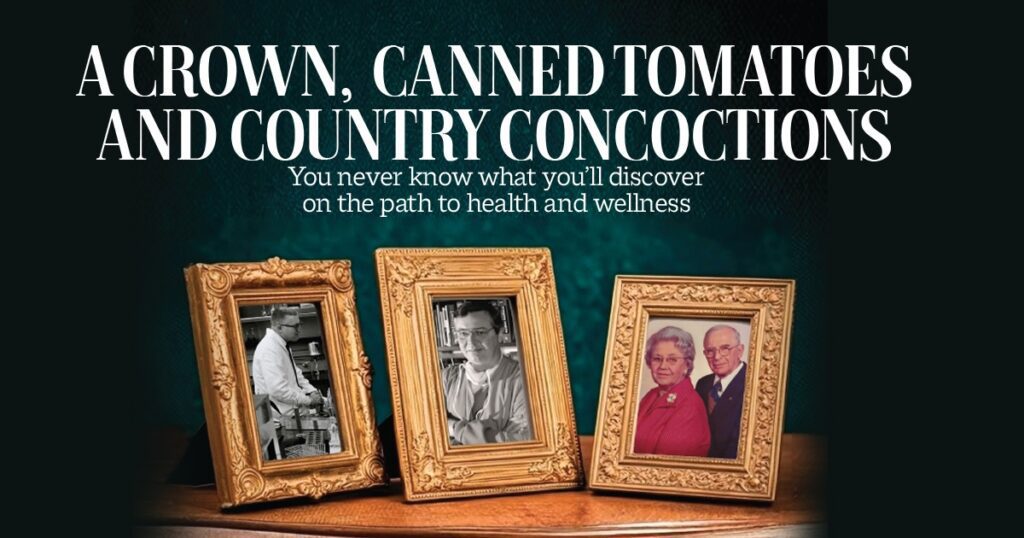30 Sep 2024 A crown, canned tomatoes and country concoctions
By Vivian Lawson Hogue
In past eras, our town and country have seen many beneficial medicines used successfully, and some not so much. In early days, what concoctions were created to cure would either cure or kill. Even tainted water sources used by our country’s pioneers carried cholera and typhoid fever. I can imagine the conversation: “Here, drink this and see if it makes you feel better.” “Uh, no, you go first.”

In my great-grandparents’ era, a pick-me-up for the elderly was powdered sugar, an egg and a little brandy. A tea of catnip leaves, a few drops of paregoric (now outlawed) and a little sugar would put a colicky baby to sleep. Leg cramps? Just place an old pair of shoes upside down under your bed.
Let’s go into much later times and find fortunate turnarounds experienced by local residents in what was modern medicine.
There are not many locals who remember Dr. Harry Meyer, MD, but it was he who co-developed the rubella vaccine. A native of Texas, he later lived in Conway where he graduated from Hendrix College and the University of Arkansas School of Medicine in Little Rock. Rubella, or “German measles,” is a contagious viral infection dangerous for unborn babies whose mothers become infected during pregnancy. Today, women of childbearing age, but not pregnant, and children older than 12 months should receive this legacy left by Dr. Meyer and his co-developer, Dr. Paul Parkman.
In 1943 when my dad’s life was in the balance from osteomyelitis related to a medically unwise tooth extraction, physicians in Little Rock struggled to find solutions for this man who had a wife and four children, soon to have No. 5 any minute. They bravely decided to try a new drug, an early version of penicillin. He recovered and returned home after I was born. On the dedication page of his book published in 1972 at age 72, he wrote, “To the Crown of Our Wishes–a daughter.” My parents spent a few years trying to keep that crown straight.
My brother, Noel (1939-2016), and I emailed often, especially after our parents’ deaths. In one of those emails, he said he regretted not being the best of sons during the last years of our mother’s feeble condition. As a cardiac-anesthesiologist living out of state, he was unable to be of help, although he called and wrote often. In the course of one exchange, we spoke of his high school days when mother worried about his “sass-back” tendency and taking risks. In college, he and some friends were emptied out of their boat into the Buffalo River, managing to grab floating or overhanging limbs to stay above the raging waters of spring [season]. Later, after remembering that she made our clothing on her vintage treadle sewing machine, I sent this message to him: “Don’t dwell on what you feel was your lack of attention during mother’s last years. I think you made up for that in your heartfelt eulogy. Of all of us, you were probably the one she would have been the most proud of giving it. I’m sure that for many years she treadled her prayers down to the last inch of thread and into the wee hours with thoughts of you under her foot.”
The next morning, he replied, “I was too moved last night to comment on one item in this epistle of yours. It evoked powerful thoughts and images in my memories of the extra lengths she took for me—and for all of us. She was stern, but loving, in keeping us on the straight and narrow. I recognized later the extra trouble I had caused her along the way with my rebellious ways and rhetoric.
“It began even before my birth with the dire circumstances of carrying her fourth son to term. Her pregnancy with me threatened both our lives, but she submitted to an experimental drug (newly synthesized progesterone) rather than lose either. The fact that I was not aborted (naturally or medically as recommended) is a story in itself. She took the medicine and the next day was canning tomatoes.
“Over the years she never failed to call on my birthday to remind me how hot it was (112°) the day I was born, or make an angel food cake if I was home. I think she was telling me that the misery of her labor was inconsequential compared to the miracle that I was even born, and reminding me of my worth to her. And put that sentence away somewhere for safekeeping. You should use it again somewhere, sometime. If you don’t, I will.”
So here it is, Noel. I know your words will serve to encourage others to stay in touch with family. And now…if you’ll just give me back my other skate, I’ll tell you where I hid your baseball mitt.
- They found their ‘true grit’ - January 5, 2026
- And that’s what Christmas is really all about - December 2, 2025
- Giving thanks - November 4, 2025









